
Kenneth Gilbert More, CBE was an English film and stage actor.

John Saxon was an American actor who worked on more than 200 film and television projects during a span of 60 years. He was known for his work in Westerns and horror films, often playing police officers and detectives.
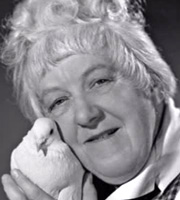
Miss Robin Hood is a 1952 British comedy film directed by John Guillermin, and starring Margaret Rutherford and Richard Hearne. Other actors involved include Dora Bryan, James Robertson Justice, Peter Jones, Sid James, Reg Varney, Kenneth Connor and Michael Medwin. The film features a variety of unusual camera work such as unexpected extreme close-ups and fast motion sequences.

The Bedford Incident is a 1965 British-American Cold War film directed by James B. Harris, starring Richard Widmark and Sidney Poitier, and produced by Harris and Widmark. The cast also features Eric Portman, James MacArthur, Martin Balsam, and Wally Cox, as well as early appearances by Donald Sutherland and Ed Bishop. James Poe adapted Mark Rascovich's 1963 novel of the same name, which borrowed from the plot of Herman Melville's Moby-Dick; at one point in the film, the captain is advised he is "not chasing whales now".

Francis Bosley Crowther Jr. was an American journalist, writer, and film critic for The New York Times for 27 years. His work helped shape the careers of many actors, directors and screenwriters, though his reviews were criticized as unnecessarily harsh. Crowther was an advocate of foreign-language films in the 1950s and 1960s, particularly those of Roberto Rossellini, Vittorio De Sica, Ingmar Bergman, and Federico Fellini.

The Trials of Oscar Wilde, also known as The Man with the Green Carnation and The Green Carnation, is a 1960 British drama film based on the libel and subsequent criminal cases involving Oscar Wilde and the Marquess of Queensberry. It was written by Allen and Ken Hughes, directed by Hughes, and co-produced by Irving Allen, Albert R. Broccoli and Harold Huth. The screenplay was by Ken Hughes and Montgomery Hyde, based on an unperformed play The Stringed Lute by John Furnell. The film was made by Warwick Films and released by Eros Films.
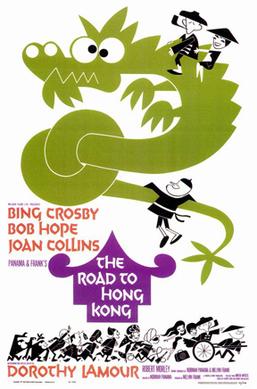
The Road to Hong Kong is a 1962 British semi-musical comedy film directed by Norman Panama and starring Bing Crosby and Bob Hope, as well as Joan Collins, with an extended cameo featuring Dorothy Lamour in the setting of Hong Kong under British Rule. This was the seventh and final installment in the Road to … series and the only one made without the involvement of Paramount Pictures, though references to the others in the series are made in the film and shown in Maurice Binder's opening title sequence.
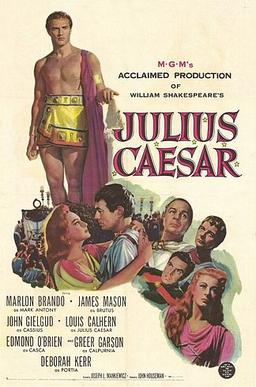
Julius Caesar is a 1953 American film adaptation of the Shakespearean play, directed by Joseph L. Mankiewicz and produced by John Houseman for Metro-Goldwyn-Mayer. It stars Marlon Brando as Mark Antony, James Mason as Brutus, Louis Calhern as Caesar, John Gielgud as Cassius, Edmond O'Brien as Casca, Greer Garson as Calpurnia, and Deborah Kerr as Portia.

The Greengage Summer is a 1961 British drama film directed by Lewis Gilbert and starring Kenneth More and Susannah York. It was based on the novel The Greengage Summer (1958) by Rumer Godden. Set in Épernay, in the Champagne region of France, it is the story of the transition of a teenage girl into womanhood.

The Angry Silence is a 1960 black-and-white British drama film directed by Guy Green and starring Richard Attenborough, Pier Angeli, Michael Craig and Bernard Lee.

Countdown is a 1967 science fiction film directed by Robert Altman, based on the 1964 novel The Pilgrim Project by Hank Searls. Made before M*A*S*H, the film was subject to re-editing by the studio. Countdown stars James Caan and Robert Duvall as astronauts vying to be the first American to walk on the Moon as part of a crash program to beat the Soviet Union.
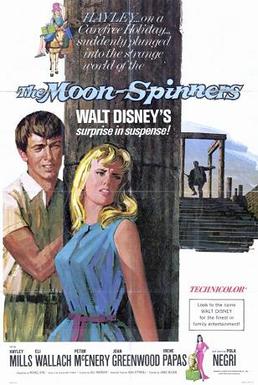
The Moon-Spinners is a 1964 American mystery film starring Hayley Mills, Eli Wallach and Peter McEnery in a story about a jewel thief hiding on the island of Crete. Produced by Walt Disney Productions, the film was loosely based upon a 1962 suspense novel by Mary Stewart and was directed by James Neilson. It featured the legendary silent film actress Pola Negri in her final screen performance.
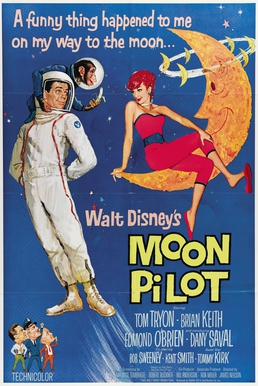
Moon Pilot is a 1962 American Technicolor science fiction comedy film from Walt Disney Productions, released through Buena Vista Distribution, directed by James Neilson, and starring Tom Tryon, Brian Keith, Edmond O'Brien, Dany Saval, and Tommy Kirk. The film is based on Robert Buckner's 1960 novel Starfire, and reflects Disney's interest in America's space program during John F. Kennedy's presidential era in the early 1960s.
Manpower is a 1941 American crime melodrama directed by Raoul Walsh and starring Edward G. Robinson, Marlene Dietrich, and George Raft. The picture was written by Richard Macaulay and Jerry Wald, and the supporting cast features Alan Hale, Frank McHugh, Eve Arden, Barton MacLane, Ward Bond and Walter Catlett.
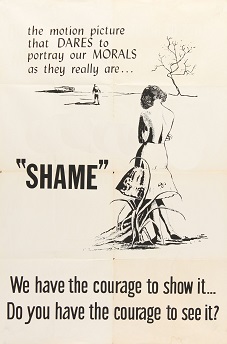
The Intruder, also known as I Hate Your Guts, Shame and The Stranger, is a 1962 American drama film directed and co-produced by Roger Corman and starring William Shatner. The story, adapted by Charles Beaumont from his own 1959 novel of the same name, depicts the machinations of a racist named Adam Cramer, who arrives in the fictitious small Southern town of Caxton in order to incite white townspeople to racial violence against black townspeople and court-ordered school integration.
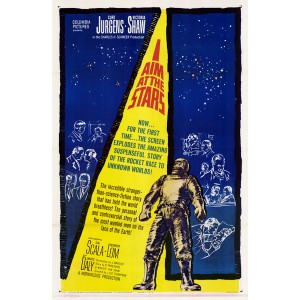
I Aim at the Stars is a 1960 biographical film which tells the story of the life of Wernher von Braun. The film covers his life from his early days in Germany, through Peenemünde, until his work with the U.S. Army, NASA, and the American space program.

For Them That Trespass is a 1949 British crime film directed by Alberto Cavalcanti and starring Richard Todd, Patricia Plunkett and Stephen Murray. It is an adaptation of the 1944 novel of the same name by Ernest Raymond.

Kisses for My President is a 1964 comedy film directed by Curtis Bernhardt and starring Fred MacMurray and Polly Bergen. Leslie McCloud (Bergen) makes history when she is elected the first female president of the United States. However, her husband Thad McCloud (MacMurray) is less enthusiastic. The picture's supporting cast features Eli Wallach, Arlene Dahl, Edward Andrews, and Donald May.
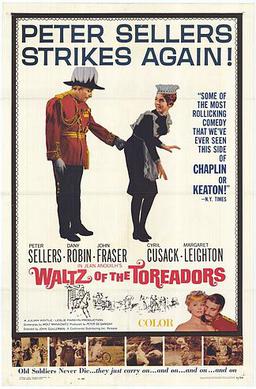
Waltz of the Toreadors is a 1962 film directed by John Guillermin and starring Peter Sellers and Dany Robin. It was based on the play of the same name by Jean Anouilh with the location changed from France to England. It was nominated for a BAFTA Award for Best British Screenplay, in 1963.
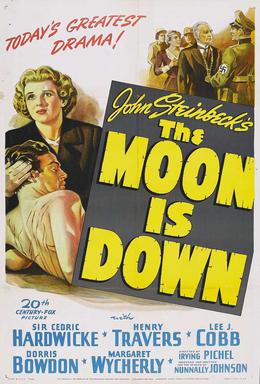
The Moon Is Down is a 1943 American war film starring Cedric Hardwicke and Henry Travers and directed by Irving Pichel. It is based on the 1942 novel of the same name by John Steinbeck.


















